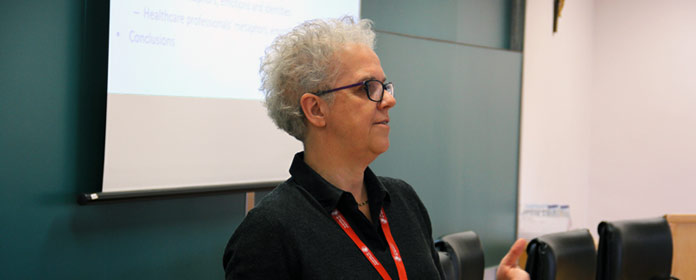"We use metaphors to talk about subjective, emotional, sensitive and difficult experiences, and cancer is all of these things"
Elena Semino, professor of stylistics and linguistics at the University of Lancaster, participated in a workshop on metaphor organized by the Institute for Culture and Society

FOTO: Elena Beltrán
"We use metaphors to talk about subjective, emotional, sensitive and difficult experiences, and cancer is all of these things." Elena Semino, a professor at the University of Lancaster, argued along these lines at the International Workshop MetaforUN "Metaphor, Emotions and Identity." The event was organized by the Public Discourse project of the Institute for Culture and Society at the University of Navarra.
Semino has conducted research on the metaphors that patients, doctors and families use to talk about cancer and its importance in expressing this experience. One of her studies includes a corpus with a million and a half words used in interviews and in online forums. "We found more metaphors in online interactions than in our interviews because of the feeling of intimacy that the internet encourages," the expert argues.
She has also analyzed the idea of a “good” or “bad” death. The expert argues that, although death is a difficult issue, professionals in the healthcare fieldaim for patients to have the best possible death. "But they have a particular vision of what a ‘good death’is in relation to acceptance," she points out. In this way, they consider a bad death one in which the patient does not accept his or her future, or that does not want to talk about the subject. However, Semino notes that illness has so many facets and every person is different, thus there are many legitimate ways of living out illness "if it is what the patient wants and as long as they do not harm anyone else."
The metaphor of fighting illnessIn her research, the expert found that some metaphors related tofighting illness can be negative. "Patients may feel that they have failed if a treatment does not work, that they are losing the battle," she says, "although, at the same time,this can be very motivating for some, offering them a purpose." These contrasting reactions have led her to think that, "we should avoid generalizing and thinking that certain metaphors are always good or bad; we must look at the metaphor in particular, who uses it and what it implies for that person." For this reason,her research group has created what they call "a menu of metaphors" so that patients and professionals can choose the one they prefer to use to talk about the subject.
In addition to Elena Semino, Cristina Soriano, a researcher at the Swiss Center for Affective Sciences at the University of Geneva, spoke on emotions’ differences in different languages. For her part, Carmen Sancho, from the Polytechnic University of Madrid, encouraged the promotion of metaphorical literacy in educational and research settings.




